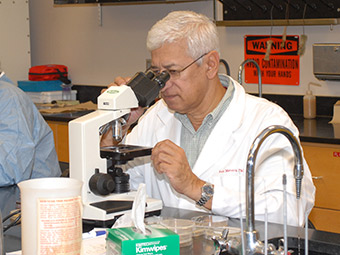Document Type
Article
Publication Date
1-2004
Abstract
Our objective was to evaluate the influence of water quality and sediment chemistry on the survival and growth of Halodule wrightii transplanted onto unconsolidated dredged materials in Lower Laguna Madre, TX. Subsequent to transplanting activities, we measured environmental conditions and seagrass parameters at transplant and natural beds over a 1-yr period. Although water quality characteristics at the transplant and comparison sites were compatible with seagrass growth, transplants failed to survive for more than a few months. Seagrasses at natural sites received high light (>6000 mols m−2 y−1) and exhibited typical patterns of annual growth, biomass and density as well as sediment chemical parameters. In contrast, the estimated annual quantum flux of 2500 to 3200 mols m−2 y−1 at the transplant sites was near the minimum light requirements for H. wrightii. The marginal light environment was a consequence of high turbidity from wind-driven sediment resuspension. Sediment erosion at the transplant site also resulted in a 30 cm increase in water depth. Sediment NH4 concentrations at the transplant sites were at or above the maximum values for Texas seagrasses (up to 600 µM). Although NH4 is generally considered a nutrient, recent evidence suggests that moderate to high NH4 concentrations can be toxic to below ground tissues. We hypothesize that substrate loss, chronic stress from elevated sediment NH4 levels coupled with minimal light caused the demise of the H. wrightii transplants. Consequently, this work illustrates the importance of site history and sediment bio-geochemistry as factors that control the success of seagrass transplanting efforts.
Recommended Citation
Kaldy, James E., Kenneth H. Dunton, Joseph L. Kowalski, and Kun-Seop Lee. "Factors controlling seagrass revegetation onto dredged material deposits: a case study in Lower Laguna Madre, Texas." Journal of Coastal Research 20, no. 1 (2004): 292-300. https://doi.org/10.2112/1551-5036(2004)20[292:FCSROD]2.0.CO;2
Publication Title
Journal of Coastal Research
DOI
10.2112/1551-5036(2004)20[292:FCSROD]2.0.CO;2



Comments
Original published version available at https://doi.org/10.2112/1551-5036(2004)20[292:FCSROD]2.0.CO;2